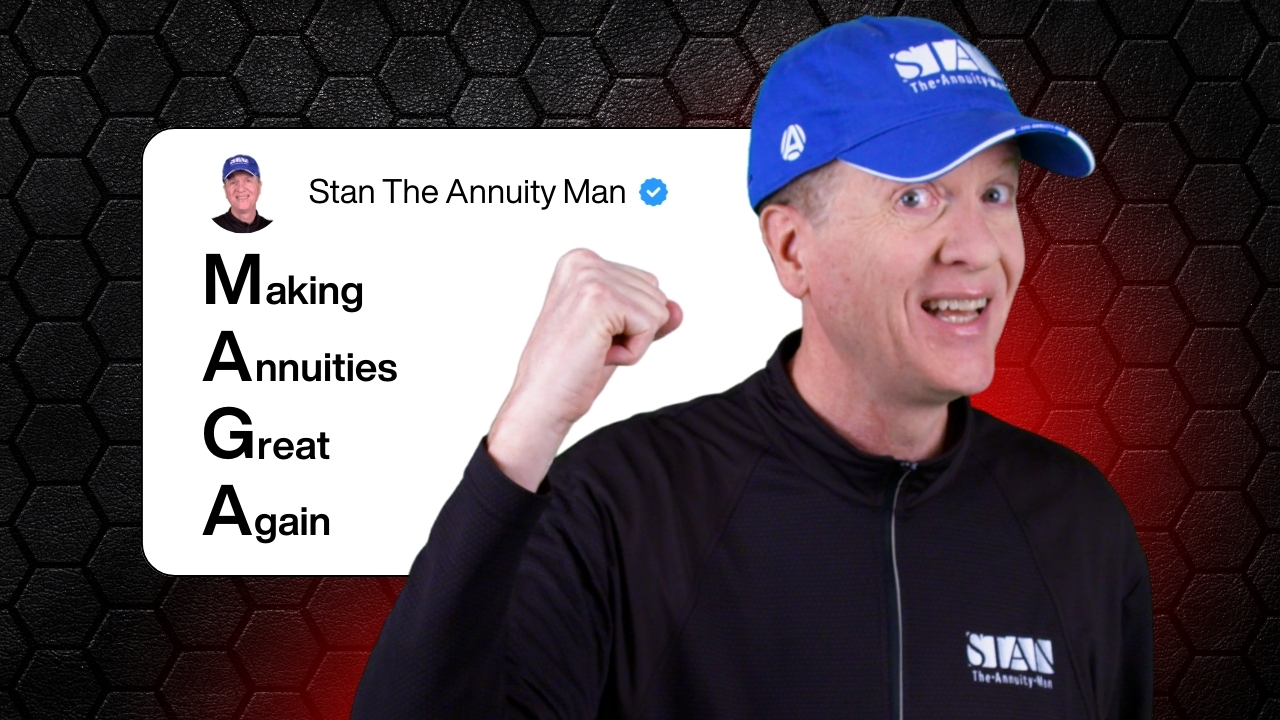Table of Contents
Beware of Elder Annuity Abuse: Shootin' It Straight With Stan

Welcome to Shooting It Straight With Stan. I'm your host Stan The Annuity Man, America's annuity agent, licensed in all 50 states. Today's topic is a disturbing one, but one that needs to be discussed, and it's called Beware of Elder Annuity Abuse.
The Bad Apples
The annuity industry is just like any sales industry. There are bad apples in every single sales industry. Pick one; there are bad apples in there. But in the world of retirement and retirement funds, and most of this country's money being held by people who are 60 years of age or older, I don't know what the stats are, but I've read them before, and they're gargantuan. Most of the large IRA assets are owned by senior citizens. Then there's obviously going to be a target for not only annuity salespeople to target old people but anybody in the fan financial world to get ahold of that money so they can make commissions on it. But in the annuity space, what I'm seeing is a little disturbing with some, not all, most agents do not do this, obviously. It's a pretty clean industry, but some out there are targeting elderly people and convincing them to do things they should not do. So, if you are someone that considers themselves elderly, I don't know what that number is for you, or if you're reading this and you have a family member that has money being managed by somebody, or you're not too sure what they're doing and what they're being told or what they're being shown or what they're being sold, then you need to get more proactive because there's a lot of bad things that are going on. Let me point out a few that I've seen because people call me for second opinions, and what do you think about this? Should Mom have purchased this? And often, it is just a horrific, horrific thing that I'm seeing.
The P.I.L.L Acronym
Now number one, with annuities of all types, you own them for what they will do, not what they might do, and what they will do are the contractual guarantees. For the senior citizen, and elderly people out there, you should be buying contractual guarantees, and that's either primarily principal protection or lifetime income. Now, I do have an acronym called P.I.L.L.; P stands for Principal protection, I stands for Income for life, L stands for Legacy, leaving money to your heirs, and the other L stands for Long-term care, confinement care. In my world, which the annuity industry should live in, those are the four things that annuities should be sold for because that's what they contractually solve for. Principal protection, income for life, legacy, and long-term care, not market growth. Do not allow anyone to say you need to own this for market growth.
Upfront Bonuses
You need to be careful of a couple of things out there, and I'm talking to not only you as a consumer but if you're a caregiver or a family member. This is what you need to be on the lookout for. Upfront bonuses. Upfront bonuses are typically attached to Indexed Annuities. For the elderly person out there, they're being told that this is free money and that the annuity company's giving them free money. You and I both know that there are no philanthropists at annuity companies. An upfront bonus you're going to pay for. There are a hundred pennies in a dollar. It's not too good to be true. I call upfront bonuses candy for the stupid, no offense to the stupid. But it is. If you believe that, then I mean, you're the rube at the table, as they say it. In Vegas, they go, if you don't know who the sucker at the table is, guess what? It's you. So, you have got to be very careful with that.
The second thing, if it sounds too good to be true, it is every single time. If something sounds great, like market upside, and you get free this and free that, it's too good to be true. Be careful with those sales pitches and buying things not on the contractual guarantees of the policy or some hypothetical or back-tested number shown to you.
Keep It Short
The other thing I see a lot of is keeping the maturity short for Deferred Annuities, like Multi-Year Guarantee Annuities, Index Annuities, and Variable Annuities. I don't sell variable annuities because I don't sell anything that has the potential to go down. But keep the maturity short. In other words, the longer the surrender charge period, the higher the commission for the agent. Now, commissions are built in, and you never see them. Still, they keep showing you the 10 year surrender charge products and 14 year surrender charge products. Most states don't even allow that, but some do, then those are high-commission products. Most of those products can be purchased in a shorter duration format, meaning sales charges, but the commission to the agents is smaller.
One of the things is if someone's showing you a 10-year, say, "Do you have a five-year version of that?" Because most of the time they do, a lot of times they do or they have a seven-year, they got something shorter, they're just showing you the 10-year, and then they're going to try to justify why you need to do the longer version, blah, blah, blah, and potential and index, just a bunch of garbage.
Keep It Simple
The other thing you have to look at and remember is to always keep it simple. Always keep it simple. If you cannot explain the product that's being presented to you and pushed on you to a nine-year-old, no offense to nine-year-olds, but if you couldn't sit down with a nine-year-old and explain the product to them and them actually conceptually and mathematically understand it, then you should not buy it, ever. If you can't explain it, you should not buy it. If you don't understand it, you should not buy it. If you have any questions, ask for a specimen policy. We'll send a specimen policy here at The Annuity Man. Any good, honorable agent or advisor would send you a specimen policy to review because there's no urgency to buy an annuity. The urgency for you is to understand what you're buying.
Now, annuity companies will issue policies up to a very, very late age of 90s, but at that point in time, the question is should you buy it as a 90-year-old? Are the family members agreed for them to buy it as a 90-year-old? And why are you buying it? Are you buying it for legacy? Are you buying it for income? Are you buying it because you're moving into a facility, and that facility requires a certain amount of money to pay every single month? Those situations might be suitable and appropriate for an annuity purchase, but the older you get, you must be careful about what you're buying.
The other day, I ran into a situation where a person in their late 70s was sold a 10-year plus surrender charge product. My question was, why? Why would anyone do that? There may be one out of a hundred situations where that makes sense, but I guarantee that it wasn't this situation. If you're a family member, caregiver, or someone that wants to take care of that person and cognitively they're declining a little bit, get involved and find out what's being pitched.
Red Flags
The other thing that you have to be careful of is if someone approaches you, let's just say you already own annuities or the person you're worried about owns them, and they're Deferred Annuities. If some agent approaches them or advisors and says, "I've got a better one, and I want to transfer the one you have to the other one," that's a semi-red flag. I'm not saying it's a total red flag because in the annuity industry, when you move an annuity from one annuity company to the other, the receiving annuity company has to have a contractually guaranteed better deal for the person that's moving their annuity. That doesn't mean upfront bonuses. So, if someone's saying, "Let's move this, and you'll get an upfront bonus," or, "Let's move this and take the surrender charges, and the upfront bonus will make up for it," that's a problem. That person should not be doing that as an agent. That's an issue.
Transferring Annuities
Annuity companies receiving money from other companies can be IRA to IRA transfer non-taxable event or IRS code 1035, non-IRA transfer, non-taxable event. The receiving annuity company has to make sure that where they're going and where the money will go has to make sense for the person contractually. They're not leaving benefits on the table.
Let me give you an example. Suppose you buy an Index or Variable Annuity with an Income Benefit Rider or a confinement care rider, that rider amount grows at these higher interest rate levels just for that income stream calculation. In that case, that's not a transferable amount. In other words, the lower valuation accumulation value is transferable, not the income rider amount, and, often, not the bonus amount. So, you have to look at that. What are you leaving on the table? Because the annuity company that's receiving will look at that, and if the agent correctly and honestly fills out the application and the receiving company sees that so many benefits are being left on the table at the old annuity company, they'll tell you to stay.
In many cases, people call me and say, "What do I do with this thing that I bought?" Most of the time, we have to make lemonade. Why? Because annuity companies are smart, and they structure these products so that those benefits you've been paying for all these years are not transferable or liquid. You can't cash them in. You've got to stay in the policy to access that higher number and access the benefit. And that's okay, but you can't allow people to, what they call in the business churning or twisting, that's what they call it, it's churning an account or twisting an account, twisting to move to another carrier.
The Application Process
The other thing, and I'll close with this, and there are many things, but I wanted to give you some heads up. When you fill out an application, hopefully, you will use us. I would love for you to use us. Go to our site. We handle people in all 50 states. Brutally honest. We're not perfect, but boy, we'll tell you the truth. But when you fill out an application, you need to look at that application. You need to see what's being put down on that application. Now, for everything we do, we show you that application, and you have to read everything. All the information you provide to us is confidential. We don't share, keep, or sell any of that, and then sign off on it.
But there are times, and I've seen it, not a lot, but I've seen it to where the annuity agent or advisor needed to properly fill out the application, whether voluntarily or involuntarily. They didn't list all of the annuity assets because the annuity industry suggests that no more than 50% of your investible assets, which doesn't include your house, car, or guitar, your investible assets are in annuities. And I've seen situations where agents did not fill out the application right and put the person 85% or 90% of their money in annuities. That's wrong. That's horrifically wrong. I'm not trying to scare you. I'm trying to get your thinking cap on, get your logic cap on, and ensure that just common sense applies. Common sense applies to if it sounds too good to be true, it is. Common sense applies to the shorter the duration, the better. Common sense applies to buying it for the contractual guarantees only. Common sense applies to upfront annuity bonuses are not free money. It's common sense.
Unfortunately, in the financial industry, people sometimes lose that common sense cap and make mistakes based on hopes and dreams, expectations, and believing the sales pitch. You don't believe the sales pitch. You believe the contract that you're going to get because you're buying a contract. You're going to get a policy in the mail from the annuity company, and what's in that policy is what's going to happen. So you might want to take a look at it before you sign that paperwork.
Be aware of that elder annuity abuse out there because it does exist. We're trying to clean it up and help the industry clean it up. But I hope that helped you. If you have any questions, go to our site, schedule a call with me or my team, and we will answer any questions. We will review anything that you've been sold or purchased in the past to tell you A, if it's okay, B, if it is transferable in your best interest, or C, do you have to stay there and make lemonade. My name is Stan the Annuity Man. I'll see you next time.
Never forget to live in reality, not the dream, with annuities and contractual guarantees! You can use our calculators, get all six of my books for free, and most importantly book a call with me so we can discuss what works best for your specific situation.
.png)
.svg)












































.jpg)


.jpg)
.jpg)
.jpg)
.jpg)

.jpg)



.jpg)
.jpg)
.jpg)
.jpg)
.jpg)
.jpg)
.jpg)


.jpg)
.jpg)
.jpg)
.jpg)

.jpg)
.jpg)


.jpg)

.jpg)

.jpg)

.jpg)
.jpg)
.jpg)

.jpg)
.jpg)
.jpg)

.jpg)
.jpg)
.jpg)


.jpg)







.jpg)

.jpg)